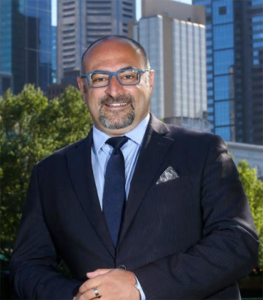Global plan for refugee resettlement
Developed countries would be forced to accept more refugees or pay up for not pulling their weight under an international resettlement plan proposed by federal Labor MP Peter Khalil.
Mr Khalil says his “fair share agreement” could see hundreds of thousands more refugees resettled each year.
 He said the global approach would help take toxicity out of the refugee debate, saying those on the far right saw asylum seekers as potential terrorists, while those on the far left saw them as stricken moral angels.
He said the global approach would help take toxicity out of the refugee debate, saying those on the far right saw asylum seekers as potential terrorists, while those on the far left saw them as stricken moral angels.
Speaking at the Alfred Deakin Institute for Citizenship and Globalisation in Melbourne on Monday, Mr Khalil proposes an agreement in which multiple countries would agree to lift their ambition to resettle hundreds of thousands more refugees each year.
Each country’s commitment to settle more refugees would be calculated based on negotiated metrics – including population, GDP per capita and historical refugee intake – while nations that opt out would have to make financial contributions to help pay for the resettlements.
The formula would produce each country’s yearly refugee intake and, because each country would be doing their fair share, would de-politicise the domestic decision-making around refugee policy that plagues Australia and other nations,” Mr Khalil said.
“Coupled with the retention of anti-people-smuggling operations, a ‘fair share agreement’ with multiple countries taking more refugees each year, the ‘queue’ will finally be moving,” he said.
“This would not only be a more humane alternative to indefinite detention, but over time significantly reduce the demand for people smuggling.”
With the world only resettling 92,400 of the 25.9 million refugees last year, Mr Khalil said Australia’s “fortress mentality” may no longer work.
Australia resettled more than 12,000 refugees under its humanitarian intake last year while Canada (28,076) and the US (22,938) led the way.
Other First World countries such as Spain (830), Korea (26) and Japan (22) have refused to increase their numbers.
Mr Khalil, a former Victorian multicultural commissioner and national security policy adviser to former Prime Minister Kevin Rudd, said there was still an opportunity to lead an international effort and that should start next week at the first United Nations Global Refugee Forum in Geneva.
But he said Australia’s approach had “failed globally and domestically”, with the conservative side of politics post-Tampa creating a framework that “positions asylum seekers and refugees as external threats to be feared”.
“Those on the right see in every refugee a potential terrorist, while those on the left see in every refugee a stricken moral angel,” he said.
“Stretched between the figure of the victim and the victimiser, the dignity of the refugee’s individuality and humanity has worn away in order to generate the two sides of a convenient coin.
“What is incontestable is that whether refugees are vilified by the right or victimised by the left, demonised or idealised, the resultant cultural cacophony has generated no viable plans for current and future management of the issue,” Mr Khalil said
The son of migrants who came to Australia from Egypt, Mr Khalil said the Morrison government’s “dog-whistling” over the medevac laws, which repealed last week, was “obscene” and “simply not true”.
He said he was proud of Labor’s policy to double the annual intake of to a total of 32,000 refugees.
Mr Khalil said history showed there were viable alternatives to Australia’s current approach, pointing out the 69,877 refugees Australia resettled from Vietnam, Laos and Cambodia between 1975 and 1995, with the vast majority flying to the country once their claims were processed through regional agreements in Asia.












